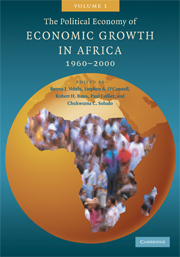Book contents
- Frontmatter
- Contents
- List of figures
- List of tables
- List of contributors
- Foreword
- List of acronyms
- PART 1 OVERVIEW
- PART 2 INTERPRETATION
- PART 3 EXPLANATION
- 9 The evolution of global development paradigms and their influence on African economic growth
- 10 Political reform
- 11 Endogenizing syndromes
- PART 4 LOOKING AHEAD
- Index
- References
10 - Political reform
Published online by Cambridge University Press: 09 January 2010
- Frontmatter
- Contents
- List of figures
- List of tables
- List of contributors
- Foreword
- List of acronyms
- PART 1 OVERVIEW
- PART 2 INTERPRETATION
- PART 3 EXPLANATION
- 9 The evolution of global development paradigms and their influence on African economic growth
- 10 Political reform
- 11 Endogenizing syndromes
- PART 4 LOOKING AHEAD
- Index
- References
Summary
This chapter describes the process of political reform in late twentieth-century Africa and explores its impact on the economic behavior of governments. When I speak of “political reform,” I refer to the movement from no-party or one-party to multi-party political systems or from military to civilian regimes. Largely ignoring political liberties – freedom of association and expression, for example – and political rights – such as the right to vote and campaign for office – I join with Ottaway (1997), Ihonovbere (1998), and others (e.g. Hutchful 1997)) in distinguishing between democratization and reform, and focus solely on the latter.
To trace the trajectory of political reform, I turn to the standard chronicles and for forty-six countries over a twenty-six year period (1970–95) I ask: did the head of state in place on December 31 of that year preside over:
A no-party system – i.e. a political system in which parties were legally banned and effectively suppressed?
A single-party system?
Or a multi-party political system?
I also ask whether the head of state was – or was not –a military official. Political reform involves the transition from a no- or single-party to a multi-party political system, or from a military to a civilian regime.
Background
In the course of their strategic retreat from the continent, imperial governments first granted power to local legislatures, then shared power with cabinets that included local politicians, and finally surrendered power to local executives.
- Type
- Chapter
- Information
- The Political Economy of Economic Growth in Africa, 1960–2000 , pp. 348 - 390Publisher: Cambridge University PressPrint publication year: 2007
References
- 2
- Cited by



